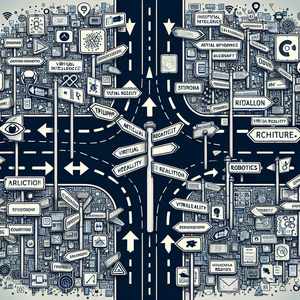The Future of Data Engineering Careers: Navigating Change in a Data-Driven World

Data engineering is no longer confined to traditional roles of building and maintaining data pipelines. Today’s data engineers are expected to have a multifaceted skill set that includes knowledge of data architecture, cloud computing, and data governance. The rise of big data technologies and tools like Apache Spark, Hadoop, and cloud services such as AWS and Azure has transformed how data is processed and analyzed. For example, organizations are increasingly relying on data lakes and warehouses, which combine vast amounts of structured and unstructured data. According to a study by Gartner, by 2025, 70% of organizations will have shifted to cloud-based data warehouses, making familiarity with these technologies essential for data engineers. Moreover, the increasing demand for real-time data processing has led to the adoption of streaming technologies, such as Apache Kafka and Apache Flink. Understanding these technologies is essential for data engineers who want to stay competitive in the job market.
Emerging Technologies and Required Skills
As the field grows, so does the need for specific skills that align with new technologies. Here are some crucial skills that aspiring data engineers should consider developing: 1. **Programming Languages**: Proficiency in programming languages such as Python, Java, and Scala is essential. These languages are commonly used in data manipulation and building data pipelines. For instance, Python’s extensive libraries for data analysis, such as Pandas and NumPy, make it a popular choice among data engineers. 2. **Database Management**: Knowledge of both SQL and NoSQL databases is crucial. Understanding when to use relational databases versus non-relational databases can significantly impact how data is stored and accessed. For example, businesses like Netflix utilize NoSQL databases like Cassandra to manage their vast amounts of user-generated data. 3. **Cloud Computing**: Familiarity with cloud platforms is increasingly important. Data engineers should be comfortable working with services like Amazon Redshift, Google BigQuery, and Azure SQL Database to manage data in the cloud. These platforms offer scalability and flexibility, allowing organizations to handle fluctuating data demands effectively. 4. **Machine Learning**: As AI continues to influence data engineering, understanding the basics of machine learning can be a significant advantage. This knowledge helps data engineers build systems that not only process data but also derive insights from it. For example, companies like Airbnb leverage machine learning to predict demand patterns, which in turn informs their data strategies. 5. **Data Governance**: With data privacy regulations becoming more stringent, knowledge in data governance, security, and compliance is essential. Data engineers must ensure that the data they handle is secure and used ethically. Familiarity with regulations such as GDPR and CCPA is becoming increasingly important for data professionals.
The Impact of AI and Automation
AI and automation are reshaping the data engineering landscape, streamlining data processes and enhancing efficiency. While some may fear that automation could threaten job security, it is more likely to evolve the role of data engineers. For instance, automation can handle repetitive tasks such as data cleaning and ETL (Extract, Transform, Load) processes, allowing data engineers to focus on more strategic activities, like designing robust data architectures and optimizing performance. Moreover, AI tools can augment decision-making by providing predictive analytics and improving data quality. Data engineers who can leverage these tools will not only enhance their productivity but also add greater value to their organizations. A report from McKinsey indicates that companies that effectively harness data and AI can increase their operating margins by 5-10%, highlighting the importance of skilled data engineers in driving business success.
Future-Proofing Your Career in Data Engineering
To thrive in this ever-evolving field, aspiring data engineers should embrace continuous learning and adaptability. Here are some strategies to consider: - **Networking and Community Engagement**: Joining professional organizations, attending conferences, and participating in online forums can provide valuable insights and connections within the industry. Platforms like Meetup and LinkedIn are excellent for finding relevant groups and events. - **Certification and Training**: Pursuing relevant certifications in cloud services, data engineering frameworks, and machine learning can bolster your credentials and demonstrate your commitment to staying current. Certifications from organizations like Google Cloud and AWS are highly regarded in the industry. - **Hands-On Experience**: Engaging in personal projects or contributing to open-source projects can provide practical experience and help build a strong portfolio. Websites like GitHub are excellent for showcasing your work and collaborating with other developers. - **Stay Informed**: Keeping up with industry trends, reading research papers, and following thought leaders on platforms like LinkedIn and Twitter can help you stay ahead of the curve. Online courses and webinars from platforms like Coursera and edX can also enhance your knowledge.
The future of data engineering is bright yet complex, marked by rapid technological advancements and shifting job requirements. For those looking to enter or advance in this field, it’s crucial to adapt to these changes by acquiring the necessary skills, embracing automation, and remaining committed to lifelong learning. By doing so, data engineers can ensure that they not only survive but thrive in the data-driven world of tomorrow. As organizations continue to seek out data-driven insights, the demand for skilled data engineers will only grow, making this an exciting field to be part of.
Data Pipeline Engineer
Spotify, Uber
Core Responsibilities
Design, develop, and maintain data pipelines for extracting, transforming, and loading (ETL) data from various sources.
Optimize data flow and performance, ensuring timely access to data for analytics and reporting.
Collaborate with data scientists and analysts to understand data requirements and ensure data integrity.
Required Skills
Proficiency in ETL tools like Apache NiFi or Talend, and programming languages such as Python or Java.
Strong understanding of SQL and NoSQL databases (e.g., PostgreSQL, MongoDB).
Experience with cloud platforms like AWS or Google Cloud for deploying data pipelines.
Big Data Engineer
Netflix, Facebook
Core Responsibilities
Architect and implement large-scale data processing systems using big data technologies like Hadoop and Spark.
Develop and manage distributed data processing applications to handle massive datasets efficiently.
Ensure data quality and consistency across various big data platforms and tools.
Required Skills
In-depth knowledge of big data frameworks (e.g., Apache Hadoop, Apache Spark).
Familiarity with programming languages such as Scala or Java for building data processing jobs.
Strong analytical skills and experience with data modeling techniques.
Cloud Data Engineer
IBM, Microsoft
Core Responsibilities
Design and implement cloud-based data solutions that support data storage, processing, and analytics.
Work with cloud services like Amazon Redshift, Google BigQuery, or Azure Data Lake to optimize data architecture.
Collaborate with cross-functional teams to provide data access and insights.
Required Skills
Expertise in cloud architecture and data services, with certifications such as AWS Certified Data Analytics or Google Professional Data Engineer.
Knowledge of infrastructure as code (IaC) tools like Terraform or CloudFormation.
Proficiency in scripting languages for automation (e.g., Python, Bash).
Data Warehouse Engineer
Target, Wells Fargo
Core Responsibilities
Design and build data warehouses that consolidate data from multiple sources for reporting and analysis.
Implement data modeling techniques to optimize data retrieval and reporting processes.
Ensure compliance with data governance and security protocols.
Required Skills
Proficiency in SQL and database design principles, along with experience in data warehousing solutions like Snowflake or Amazon Redshift.
Familiarity with ETL processes and tools to populate the data warehouse effectively.
Knowledge of data governance frameworks and compliance standards.
Machine Learning Data Engineer
Google, Amazon
Core Responsibilities
Build and maintain the infrastructure and architecture for machine learning models, ensuring data is accessible and processed efficiently.
Collaborate with data scientists to ensure data pipelines are optimized for model training and evaluation.
Monitor and optimize machine learning workflows to improve performance and reduce latency.
Required Skills
Solid understanding of machine learning concepts and frameworks (e.g., TensorFlow, PyTorch).
Proficiency in programming languages such as Python and R, along with experience in data manipulation libraries (e.g., Pandas, NumPy).
Familiarity with containerization tools like Docker and orchestration platforms like Kubernetes.


